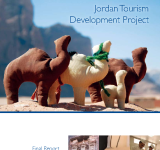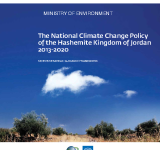tourism
The tourism sector assessment report examines critical questions related to Jordan's best opportunity areas for tourism development growth that will result in increasing tourism receipts;; private-sector investment in tourism;; and tourism-related employment. The report identifies global trends;; best practices;; and benchmarks shaping tourism demand and competitiveness. It also suggests approaches for expanding tourism in key Jordan governorates and secondary destination in ways that benefit local communities. According to the assessment;; Jordan is well-positioned to move from a regional;; multi-country tourist destination to a stand-alone destination with a portfolio of tourism products with year-round appeal for foreign and domestic visitors;; and this will require a long-term commitment from both public and private stakeholders. It suggests collaboration between Jordan's government and private sector;; localized and inclusive economic development implementation strategies and increase in the supply of skilled tourism workforce professionals.
The final report is the product of the Jordan Tourism Development Project;; which is a three-year project that operated from August 2005 to August 2008. The Project worked closely with government stakeholders;; particularly the Ministry of Tourism and Antiquities and Department of Antiquities;; along with the private sector;; local communities and the tourism industry to help develop Jordan's tourism industry. As part of the project;; the USAID/Jordan's primary aim was to develop Jordan's key tourism institutions and improve the institutional environment to better facilitate tourism development. The project also worked to change perceptions of the industry through a nationwide campaign that entailed workshops;; training sessions and delivering key messages by distributing brochures;; flyers and posters. According to the report;; the work of the USAID/ Jordan Tourism Development Project has created strong momentum among the government and private sectors;; as well as communities;; for positive development of tourism in Jordan;; leaving much scope for further development of the country's tourism sector to bring Jordan closer to operating a full-fledged tourism industry that attracts increasing numbers of tourists and effectively meets their growing demands. The report also finds several areas that still need improvement such as the awareness of the importance of tourism to Jordan;; marketing and recruitment for tourism institutions and standards of tourism accommodation.
The USAID Jordan Tourism Development Project is the largest dedicated tourism development project implemented by the United States Agency for International Development. The final report for the project phase of 2008-2013 shares success stories of developing Jordan's tourism sector and increasing the number of visitors to the country according to the updated national strategy for the current period with new targets and implementation of actions. The report highlights the projects' achievements in supporting archaeological conservation of key sites such as Petra;; Madaba and Amman Citadel and improving the visitor experience in Jordan through an extenstive nationwide training program. The final report also includes the stories of those who benefitted from USAID's investment in tourism and the USAID tourism project's comprehensive sustainable tourism industry development approach.
Jordan faces potential serious impacts on its natural ecosystems;; on its river basins and watersheds;; on biodiversity—then cascading to impacts on food productivity;; water resources;; human health;; public infrastructure;; and human settlements. Climate change will have serious implications on the country’s efforts to eradicate poverty and realize sustainable development for current and future generations— ultimately making climate change an issue of intergenerational equity. Climate change scenarios indicate that Jordan and the Middle East could suffer from reduced agricultural productivity and water availability among other negative impacts. At the same time;; a substantial potential for cost-effective reduction of GHG emissions exists in Jordan. The Policy will provide an overarching (umbrella/high level) guidance for the Government of Jordan to implement the major climate change objectives of national priority related to adaptation and mitigation of GHG emissions




